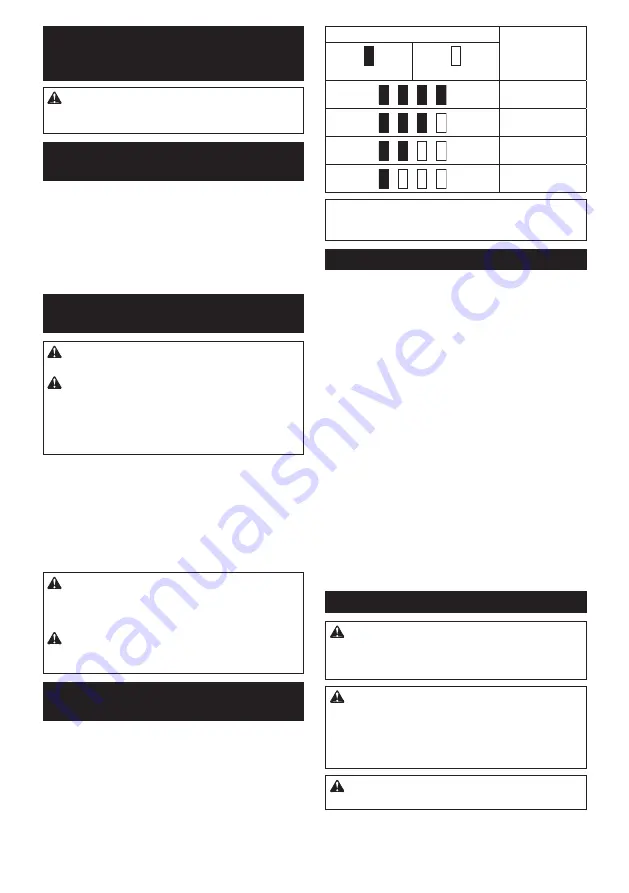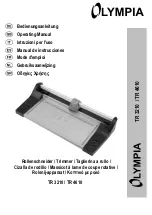
14 ENGLISH
FUNCTIONAL
DESCRIPTION
CAUTION:
Always be sure that the tool is
switched off and the battery cartridge is removed
before adjusting or checking function on the tool.
Using the tool as cordless hedge
trimmer/grass shear
For UM600D
This tool can be used as cordless hedge trimmer by
installing the shear blades for hedge trimmer (optional
accessory).
For UH201D
This tool can be used as cordless grass shear by
installing the shear blades for grass shear (optional
accessory).
Installing or removing battery
cartridge
CAUTION:
Always switch off the tool before
installing or removing of the battery cartridge.
CAUTION:
Hold the tool and the battery car-
tridge firmly when installing or removing battery
cartridge.
Failure to hold the tool and the battery
cartridge firmly may cause them to slip off your hands
and result in damage to the tool and battery cartridge
and a personal injury.
►
Fig.1:
1.
Red indicator
2.
Button
3.
Battery cartridge
To remove the battery cartridge, slide it from the tool
while sliding the button on the front of the cartridge.
To install the battery cartridge, align the tongue on the
battery cartridge with the groove in the housing and slip
it into place. Insert it all the way until it locks in place
with a little click. If you can see the red indicator on the
upper side of the button, it is not locked completely.
CAUTION:
Always install the battery cartridge
fully until the red indicator cannot be seen.
If not,
it may accidentally fall out of the tool, causing injury to
you or someone around you.
CAUTION:
Do not install the battery cartridge
forcibly.
If the cartridge does not slide in easily, it is
not being inserted correctly.
Indicating the remaining battery
capacity
Only for battery cartridges with the indicator
►
Fig.2:
1.
Indicator lamps
2.
Check button
Press the check button on the battery cartridge to indi
-
cate the remaining battery capacity. The indicator lamps
light up for a few seconds.
Indicator lamps
Remaining
capacity
Lighted
Off
75% to 100%
50% to 75%
25% to 50%
0% to 25%
NOTE:
Depending on the conditions of use and the
ambient temperature, the indication may differ slightly
from the actual capacity.
Tool / battery protection system
The tool is equipped with a tool/battery protection sys
-
tem. This system automatically cuts off power to the
motor to extend tool and battery life. The tool will auto
-
matically stop during operation if the tool or battery is
placed under one of the following conditions:
Overload protection
When the battery is operated in a manner that causes
it to draw an abnormally high current, the tool automati
-
cally stops. In this situation, turn the tool off and stop the
application that caused the tool to become overloaded.
Then turn the tool on to restart.
Overheat protection
When the tool or battery is overheated, the tool stops
automatically and the lamp blinks. In this case, let the
tool and battery cool before turning the tool on again.
Overdischarge protection
When the battery capacity is not enough, the tool stops
automatically. If you turn the tool on, the motor runs
again but stops soon. In this case, remove the battery
from the tool and charge the battery.
Switch action
WARNING:
Before installing the battery car-
tridge into the tool, always check to see that the
switch trigger actuates properly and returns to
the "OFF" position when released.
WARNING:
For your safety, this tool is
equipped with the lock-off button which prevents
the tool from unintended starting. Never use the
tool if it starts when you pull the switch trigger
without pressing the lock-off button.
Ask your local
Makita Service Center for repairs.
WARNING:
Never disable the lock function or
tape down the lock-off button.
Summary of Contents for UM600DZX
Page 2: ...1 2 3 Fig 1 1 2 Fig 2 1 2 Fig 3 1 Fig 4 1 Fig 5 Fig 6 Fig 7 2 ...
Page 3: ...1 Fig 8 2 1 Fig 9 Fig 10 Fig 11 Fig 12 3 2 1 Fig 13 1 2 3 Fig 14 Fig 15 3 ...
Page 4: ...1 Fig 16 1 Fig 17 Fig 18 Fig 19 Fig 20 Fig 21 1 Fig 22 Fig 23 4 ...
Page 5: ...Fig 24 Fig 25 1 Fig 26 1 Fig 27 1 2 3 Fig 28 Fig 29 1 Fig 30 5 ...
Page 6: ...1 Fig 31 Fig 32 1 Fig 33 1 Fig 34 Fig 35 Fig 36 1 Fig 37 1 2 Fig 38 6 ...
Page 7: ...1 Fig 39 Fig 40 Fig 41 Fig 42 Fig 43 Fig 44 1 2 Fig 45 Fig 46 7 ...
Page 8: ...Fig 47 Fig 48 Fig 49 Fig 50 Fig 51 Fig 52 Fig 53 Fig 54 8 ...
Page 9: ...1 Fig 55 1 Fig 56 9 ...















































